OCZ Vertex 3 MAX IOPS & Patriot Wildfire SSDs Reviewed
by Anand Lal Shimpi on June 23, 2011 4:35 AM ESTLet's start with the elephant in the room. There's a percentage of OCZ Vertex 3/Agility 3 customers that have a recurring stuttering/instability issue. The problem primarily manifests itself as regular BSODs under Windows 7 although OCZ tells me that the issue is cross platform and has been seen on a MacBook Pro running OS X as well.
How many customers are affected? OCZ claims it's less than two thirds of a percent of all Vertex 3/Agility 3 drives sold. OCZ came up with this figure by looking at the total number of tech support enquiries as well as forum posts about the problem and dividing that number by the total number of drives sold through to customers. I tend to believe OCZ's data here given that I've tested eight SF-2281 drives and haven't been able to duplicate the issue on a single drive/configuration thus far.
Most of the drives were from OCZ and I've tested them all on four separate platforms - three Windows 7 and one OS X. The latter is my personal system where I have since deployed a 240GB Vertex 3 in place of Intel's SSD 510 for long term evaluation. If you're curious, the 3 months I had the 510 in the MacBook Pro were mostly problem-free. It's always tough narrowing down the cause of system-wide crashes so it's hard to say whether or not the 510 was responsible for any of the hard-resets I had to do on the MacBook Pro while it was deployed. For the most part the 510 worked well in my system although I do know that there have been reports of issues from other MBP owners.
But I digress, there's a BSOD issue with SF-2281 drives and I haven't been able to duplicate it. OCZ has apparently had a very difficult time tracking down the issue as well. OCZ does a lot of its diagnostic work using a SATA bus analyzer, a device that lets you inspect what's actually going over the SATA bus itself rather than relying on cryptic messages that your OS gives you about errors. Apparently sticking a SATA bus analyzer in the chain between the host controller and SSD alone was enough to make the BSOD problem go away, which made diagnosing the source of the BSOD issue a pain.
OCZ eventually noticed odd behavior involving a particular SATA command. Slowing down timings associated with that command seems to have resolved the problem although it's tough to be completely sure as the issue is apparently very hard to track down.
OCZ's testing also revealed that the problem seems to follow the platform, not the drive itself. If you have a problem, it doesn't matter how many Vertex 3s you go through - you'll likely always have the problem. Note that this doesn't mean your motherboard/SATA controller is at fault, it just means that the interaction between your particular platform and the SF-2281 controller/firmware setup causes this issue. It's likely that either the platform or SSD is operating slightly out of spec or both are operating at opposite ends of the spec, but still technically within it. There's obviously chip to chip variance on both sides and with the right combination you could end up with some unexpected behaviors.
OCZ and SandForce put out a stopgap fix for the problem. For OCZ drives this is firmware revision 2.09 (other vendors haven't released the fix yet as far as I can tell). The firmware update simply slows down the timing of the SATA command OCZ and SF believe to be the cause of these BSOD issues.
In practice the update seems to work. Browsing through OCZ's technical support forums I don't see any indications of users who had the BSOD issue seeing it continue post-update. It is worth mentioning however that the problem isn't definitely solved since the true cause is still unknown, it just seems to be addressed given what we know today.
Obviously slowing down the rate of a particular command can impact performance. In practice the impact seems to be minimal, although a small portion of users are reporting huge drops in performance post-update. OCZ mentions that you shouldn't update your drive unless you're impacted by this problem, advice I definitely agree with.
What does this mean? Well, most users are still unaffected by the problem if OCZ's statistics are to be believed. I also don't have reason to believe this is exclusive to OCZ's SF-2281 designs so all SandForce drives could be affected once they start shipping (note that this issue is separate from the Corsair SF-2281 recall that happened earlier this month). If you want the best balance of performance and predictable operation, Intel's SSD 510 is still the right choice from my perspective. If you want the absolute fastest and are willing to deal with the small chance that you could also fall victim to this issue, the SF-2281 drives continue to be very attractive. I've deployed a Vertex 3 in my personal system for long term testing to see what living with one of these drives is like and so far the experience has been good.
With that out of the way, let's get to the next wave of SF-2281 based SSDs: the OCZ Vertex 3 MAX IOPS and the Patriot Wildfire.
The Vertex 3 MAX IOPS Drive
In our first review of the final, shipping Vertex 3, OCZ committed to full disclosure in detailing the NAND configuration of its SSDs to avoid any confusion in the marketplace. Existing Vertex 3 drives use Intel 25nm MLC NAND, as seen below:
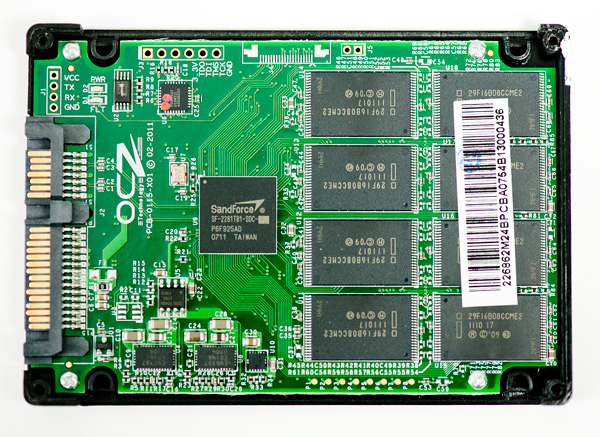
A 240GB Vertex 3 using 25nm Intel NAND
Not wanting to be completely married to Intel NAND production, OCZ wanted to introduce a version of the Vertex 3 that used 32nm Toshiba Toggle NAND - similar to what was used in the beta Vertex 3 Pro we previewed a few months ago. Rather than call the new drive a Vertex 3 with a slightly different model number, OCZ opted for a more pronounced suffix: MAX IOPS.
Like the regular Vertex 3, the Vertex 3 MAX IOPS drive is available in 120GB and 240GB configurations. These drives have 128GB and 256GB of NAND, respectively, with just under 13% of the NAND set aside for use as a combination of redundant and spare area.
The largest NAND die you could ship at 32/34nm was 4GB - the move to 25nm brought us 8GB die. What this means is that for a given capacity, the MAX IOPS edition will have twice as many MLC NAND die under the hood. The table below explains it all:
| OCZ SF-2281 NAND Configuration | |||||||
| Number of NAND Channels | Number of NAND Packages | Number of NAND die per Package | Total Number of NAND die | Number of NAND per Channel | |||
| OCZ Vertex 3 120GB | 8 | 16 | 1 | 16 | 2 | ||
| OCZ Vertex 3 240GB | 8 | 16 | 2 | 32 | 4 | ||
| OCZ Vertex 3 MI 120GB | 8 | 8 | 4 | 32 | 4 | ||
| OCZ Vertex 3 MI 240GB | 8 | 16 | 4 | 64 | 8 | ||
The standard 240GB Vertex 3 has 32 die spread across 16 chips. The MAX IOPS version doubles that to 64 die in 16 chips. The 120GB Vertex 3 only has 16 die across 16 chips while the MAX IOPS version has 32 die, but only using 8 chips. The SF-2281 is an 8-channel controller so with 32 die you get a 4-way interleave and 8-way with the 64 die version. There are obviously diminishing returns to how well you can interleave requests to hide command latencies - 4 die per channel seems to be the ideal target for the SF-2281.


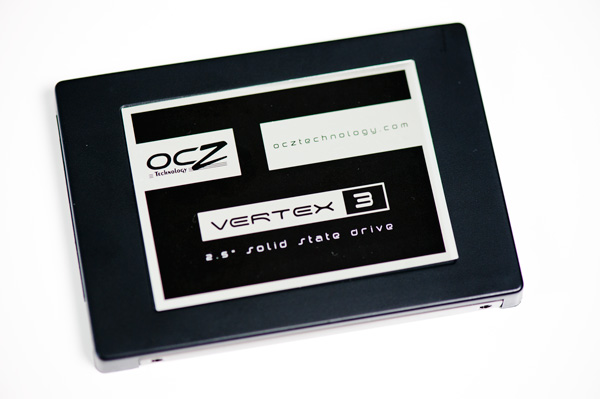
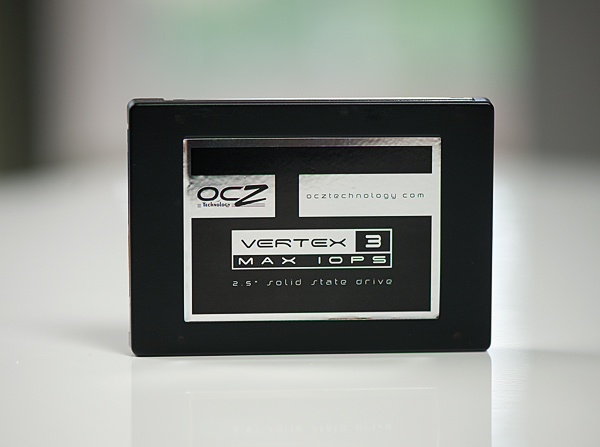
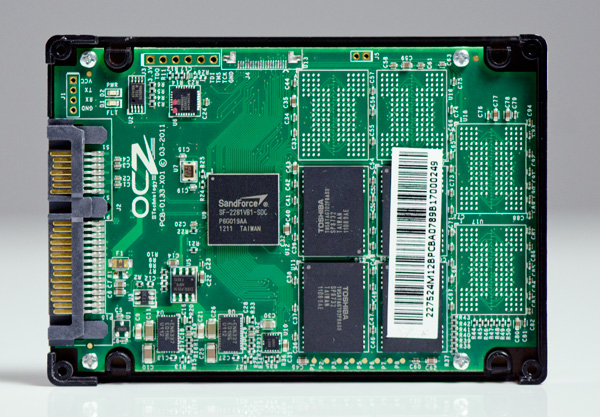
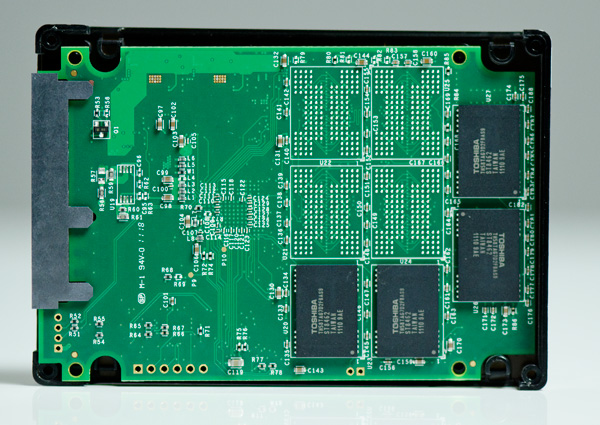
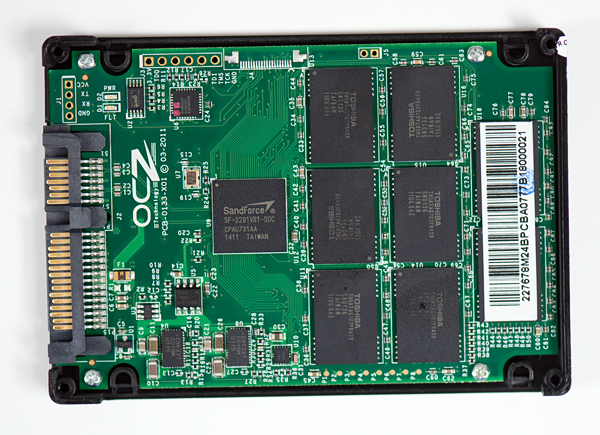
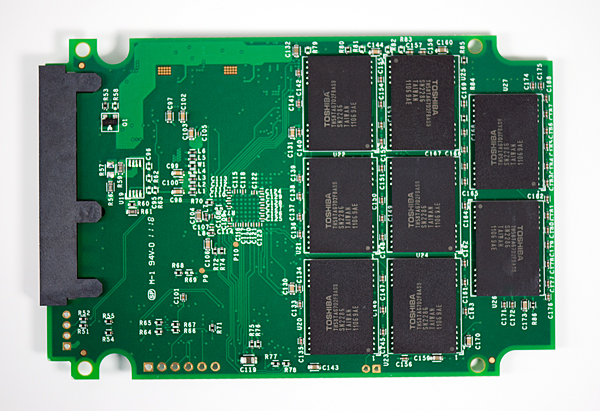








112 Comments
View All Comments
PartEleven - Sunday, June 26, 2011 - link
Anand, I'm hoping this question reaches you but I was wondering if you can comment on the Vertex 3 oem version, the V3LT-25SAT3-240G.oem. Official specs rate it as slightly slower than the retail Vertex 3, but when people asked about it on the ocz forums the mods there say it's because of different NAND. Supposedly this drive uses the same Toshiba 32nm toggle nand used as these MAX IOPS drives. Why is it then that the oem drives are slower than the MAX IOPS drives? I thought at first they might be using higher density chips so you have less NAND dies running in parallel, but you mention here that Toshiba's NAND only gets 4GB per die. What do you think is the cause for the performance difference? OCZ seems pretty reluctant to give a detailed answer.cakeab - Sunday, June 26, 2011 - link
--Something unexpected surprise--
Hello. My friend
=== {{w w w }} {{be tter whole saler }} {{ u s }} ====
Dedi cated service, the new style, believing you will love it!!!
WE ACCEPT PYA PAL PAY MENT
YOU MUST NOT MISS IT!!!
thank you!!!
-- w w w . jordan forworld . c o m -
aritai - Sunday, June 26, 2011 - link
Has been working well (no bluescreens, no crashes, no hangs, no issues w/ sleep-resume or use of bitlocker on the drive) with a Thinkpad W520/4270CT since first week of April (W7ultimate+SP1, current w/ MS, NVIDIA and Lenovo patches and drivers).However on a restart (but not on a shutdown to power off followed by power back on) there's some SATA3/Intel/IBM BIOS issue that seems to hang on the SSD read - it eventually times out (after perhaps as long as a minute) and continues booting. Rather than wait, an option is to simply force a power off (hold power button for 5 seconds) followed by re-powering on. A minor nit given Lenovo has yet to announce support for 6gbyte/s SSDs, and other than this the 4core/8thread 16gbyte dram sandybridge machine is a developer's dream (I run a handful of VMs on a 2nd SSD in the media bay, can't even tell they're VMs).
And with the 2nd-battery (that attaches on the bottom like a mini-dock), I can work all the way to Hong Kong (14+ hours) on batteries (a good thing, since there's no travel adapter yet - and may never be given they want to support 2 hour recharge and require 170W supply that no seat power can deliver. Which is a pity because the W520 automagically switches to integrated graphics and Intel turns off cores (so power meter shows < 8 watt average use in extended battery life mode). So even a 60 watt travel adapter world work save for Lenovo's BIOS doesn't / has yet to permit it.
danrichards - Tuesday, June 28, 2011 - link
MTBF, Mean Time Between Failure. Frequently advertised at 2+million hours. What kind of claim is this?Does this mean I place the drive on the shelf for 200 years, put it in to an antique computer in 200 years and it should still work? Until otherwise proven, I think so...
I bought 60GB Agility 2 for my laptop and a 120GB Vertex 3 for my desktop and both failed within two months. I'm in the process of returning one to Newegg and replacing another with OCZ (the Agility 2 for the 2nd time). The Vertex 3, I got a F4 BSOD at least twice daily (I didn't think it was possible to have 2 bad drives so I spent too many hours parting out my system and formatting it 3 times and trying different drivers to no success). Newegg was sympathetic and gave me a refund after the 30 refund period.
By the way, when one of these drive fails, there is no getting out Stellar Phoenix and recovering your data, they just pop and your data is vaporized. Do not use a SSD unless you have a solid backup plan...and don't even think using an SSD will increase your productivity. If I added up the downtime from work, frustration time, and troubleshooting time I spend with my machines, I'll give that up for a fast HDD that lasts 3-5 years (and is recoverable) and takes 4-5 seconds longer to load my Outlook.
I was extremely enthusiastic about SSDs and I'm disappointed to detail such a poor report.
PR3ACH3R - Wednesday, June 29, 2011 - link
I must agree with everything you said, its sad it is up to small builders & forum members to set the record straight about the SSD situation.If theres anything you got wrong is the MTBF abbrev ..
regarding SSDs it actually means: Mad Total Bork Freakshow.
jcompagner - Tuesday, June 28, 2011 - link
I was one of the first here that had a 240GB V3. That had the initial firmware of 2.02, with that firmware installing on my Dell XPS17 (SandyBridge) notebook that was quite difficult to do.But after i find out about 2 things: 1 use the latest intel rapid store driver (else BSOD directly after install with the first boot) and after install make sure you disable the LPM settings (else you will get stutter) everything was pretty smooth i had no BSOD after that and it was quite solid.
So the only problem with V3 was the install part on a laptop of Dell which is quite a high volume laptop out there. (and yes there are plenty other dell laptops that have the same problem because underneath they use pretty much the same stuff)
What i don't get is why OCZ seems to test many things on desktop boards, i hear always Asus board X or Gigabyte board Y. But who is using that? SSD are the perfect things in laptops because there is where the most gain is, and i wonder who is using desktops anyway currently (i don't know them anymore)
After that firmware 2.06 came out and then i made a mistake by upgrading to it (and let me say that the upgrade for a system drive what in a laptop almost always is the case....) is quite hard. But after that BSOD started happening.. 2.08 same stuff still BSOD, now with 2.09 BSOD stopped it is solid again, and i must say that my performance is still quite good. i don't notice in real life or with testing any real performance penalty.
So now for me everything is quite good again. I never reinstalled or did a secure erase (that really cost a lot of time!) .
But i wouldn't really recommend to none real technical users a OCZ drive at the moment. Installation, firmware updates are all quite hard and you really know what to do.
kaikaihhh - Tuesday, June 28, 2011 - link
hello,welcome to www.voguecatch.us,there have more top goods,like hand bag,t shirt,sun glass and so
on ,i hope everyone will like them,thanks
doodles - Sunday, July 10, 2011 - link
You asked what I'd do if I won a Eee Pad Transformer or a Samsung Galaxy Tab 10.1...so many ideas came to mind that I felt my skull crack. I'd keep up with my husband's medicines, (lung cancer), set reminders, keep his appointment schedules, And it might even entertain me while I do that interminable waiting in the dr.'s office.AeroJoe - Wednesday, July 13, 2011 - link
Exactly which version of Iometer are you using these days to run your benchmarks? The latest version at www.iometer.org is many years old - or am I looking in the wrong spot?Jphelps2630 - Monday, July 18, 2011 - link
I'm one of the lucky owners of a Vertex 3 that has the BSOD problems. Just can't get it stable. Besides BSODs, it disappears from the BIOS and corrupts the file system so Windows and Office are trashed a couple of hours after loading. It's been upgraded to the latest 2.09 firmware which didn't help.Very disappointing product. Spent a lot of money and it just doesn't work. Waiting for help from OCZ. Will let you know what they say.
I7 2600k on Asus p8z68 pro, 8gb Corsair RAM, Win7 64